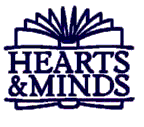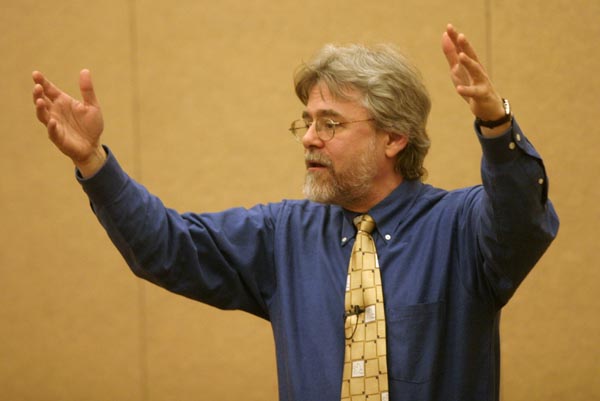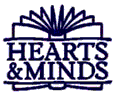more on Spirit of Democracy book
Before I move on to other new books—a new hardcover Marva Dawn called Talking the Walk for instance---or to talk about the amazingly creative and enjoyable Sufjan Stevens concerte my son and I attended last night, I want to tell about a few other chapters in this great new collection of pieces, essays by authors with whom we shared a day of dialogue in Washington a few days back. What a privilege to sell books with the Fetzer Institute, The Faith & Politics Institute , and The Center for the Study of the Presidency and Jossey-Bass publishers. This was a healthy crowd of caring folks who, under the gentle leadership of editor Mark Nepo, worked through the contents of the book.
At the conference, one of the great highlights was a very brief welcoming speech by one of the executives from the Fetzer Institute, who talked about their convictions and hope to bring a certain vision to the world, beautiful words about the passion of vocation and the power of love and forgiveness. Yes, yes. In light of that, they have convened these gatherings and commission this book. With a forward by Theodore M. Hesburgh (formerly of Notre Dame) and an important introduction by Robert Bellah, it is a significant and valuable work.
Here is how the book is arranged:
Part One: Looking and Listening for America
Two Dreams of America by Jacob Needleman. His friends called this world-renowned philosopher “Jerry” which for some reason cracked me up. His significant book The Soul of America, by the way, is now out in paperback.
Footprints of the Soul: Uniting Spirit with Action in the World by Carolyn T. Brown. She was a forceful and yet tender voice, a staff scholar at the Library of Congress.
Part Two: Suffering the American Dream
Created Equal: Exclusion and Inclusion in the American Dream by Elaine Pagels. In my last post I criticized her sloppy scholarship on Christianity and suggested that gnosticism is of little help in social reconstruction. I’ve re-read this chapter, though, and realize it is well worth reading and makes some powerful and important points.
The Grace and Power of Civility: Commitment and Tolerance in the American Experience by David Abshire. His presentation was excellent; he is an old school scholar that does remarkable study of various Presidents and the administrations they led. Fascinating stuff, and a good chapter.
Part Three: Deepening the American Dream
Breaking the Cultural Trance: Insights and Vision in America by Robert Inchausti. Meeting Bob was one of the highlights of the event for me, and I wished his role on the panel could have been expanded. Several years ago, he wrote the amazing memoir of being a teacher, Spitwad Sutras and, more recently, one of my favorite books of the year, Subversive Orthodoxy: Outlaws, Revolutionaries, and other Christians in Disguise (Brazos Press; 19.99.) It is especially a celebration of personalism---Dorothy Day, Chesterton, Illich, Berry, Merton (he wrote a book on Merton, too, by the way) and a host of novelists and poets, social critics and poets. I hope to blog more about this later as it is rare kind of book…Obviously, this is a very good chapter.
From Cruelty to Compassion: The Crucible of Personal Transformation by Gerald May. There was a tribute to the late Gerald May and his family was there, along with colleagues and friends from the Shalem Institute. He was a dear man, an important guide to the growing field of spiritual direction, and this is a brilliant chapter, making the book worth having for this alone. We stock all of his books, natch.
Part Four: Participating in the World’s Soul
Opening the Dream: Beyond the Limits of Otherness by Rev. Canon Charles Gibbs. Rev. Gibbs was there, and I sold of few of his own book on peacemaking. I regret I didn’t speak with him. I think, as an evangelical with a certain understanding of the nature of truth claims and the Story of the gospel, that I may have some significant theological differences with some within this ministry. His remarkable and extraordinary work, though, in bringing people of any and all faiths together to craft meaningful and blessed initiatives for peace and development, conflict resolution and justice, should be enough to get him the Nobel Peace Prize. Check out the United Religions Initiative organization and see the numbers of great projects, peace-building strategies, and inter-faith reform efforts they have going. Excellent.
The Politics of the Brokenhearted: On Holding the Tensions of Democracy by Parker Palmer. As I mentioned in the last few posts, it was a supreme privilege to meet Mr. Palmer and to chat with him about some mutual friends. He wished us well as indie booksellers, a blessing we shall take to heart. This chapter is about tension, about holding together the hard work of this renewal of culture stuff. As a Quaker, he has much helpful knowledge, experience, and insight into the best practices of consensus-building and ways to move forward. It is, like several of the others, an excellent chapter, well worth studying, sharing, discussing and praying through.
If we want to be, in Jesus’ good words, “salt and light and leaven” in our distorted culture, and if we desire to create spaces for good conversations of some consequence, this resource could be a very helpful investment. I hope your reading about it hear strikes your interest, and helps you at least think about how you can deepen your cares for our culture and nation.
Deepening the American Dream: Reflections on the Inner Life and Spirit of Democracy Edited by Mark Nepo (Jossey-Bass) $24.95. Order it here.
* A few of my favorite organizations and movements were under-represented at the conference, most likely because different organizational run in different crowds, hang with different folks. (Funny to think of prestigious think-tanks and non-profit leaders like teenagers in different cliques, but that is just the way social organizations tend to network.) These are groups which have thought hard about similar concerns, and would have much to offer this reconstrual of the best values of the American experience. Please visit good friends like the Center for Public Justice—working carefully on public policy concerns in light of the tradition of principled pluralism from the heritage of late 19th century Christian democrats in Holland, or the Call for Renewal---Jim Wallis and others working on a prophetic, faith-based activism that goes beyond the “religious right and the secular left”, or a character-forming “university without walls” such as Trinity Forum, who, under astute leadership of founder Os Guinness, has raised the deepest kind of questions about meaning, virtue, truth, integrity and routinely celebrates the genius of the first amendment in their work with business, political and civic leaders. Voices from these organizations would offer considerable innovation and radical wisdom to the American Dream project. It would be good to compare and contrast their respective takes on this book and the ways they understand this common task in these times...




